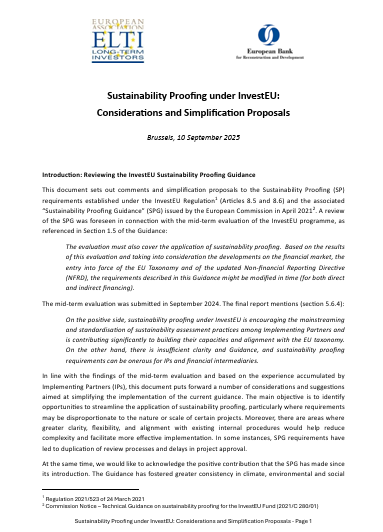This position paper evaluates the InvestEU Sustainability Proofing Guidance after the 2024 mid-term review, incorporating Implementing Partners’ experience. It recognizes progress in harmonizing sustainability standards but highlights disproportionate administrative burdens. The authors propose limiting proofing to material subprojects or corporate level, delegating legal compliance to institutional processes, and raising financial thresholds to EUR 50 million. Other recommendations include increasing the carbon footprint threshold to 100,000 tCO2e per year, providing a non-binding list of adaptation data sources, simplifying the social dimension in robust legal contexts, relying on professional judgment for economic analysis, and removing the annual sustainability report requirement. The paper calls for a constructive technical dialogue with the European Commission.
This position paper reviews the InvestEU Sustainability Proofing Guidance following the 2024 mid-term evaluation and reflects the experience of the Implementing Partners. It acknowledges the framework’s contribution to harmonizing environmental, climate, and social standards, but identifies burdens and ambiguities that compromise proportionality. The paper proposes that sustainability proofing apply only to material subprojects or, where appropriate, at corporate level; that legal compliance be ensured through existing institutional procedures; and that activation thresholds increase from EUR 10 million to EUR 50 million, with possible sectoral adjustments. It recommends raising the carbon footprint threshold from 20,000 to 100,000 tCO2e per year, removing references to negative values, and supporting adaptation through a non-binding list of data sources. The paper also advocates simplifying the social dimension in jurisdictions with strong legal frameworks, limiting the economic analysis to professional judgment, and eliminating the annual sustainability summary report by relying on existing metrics. It concludes by inviting further technical dialogue with the European Commission.
